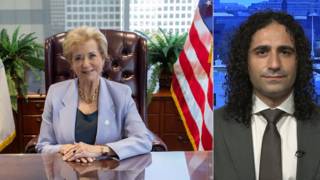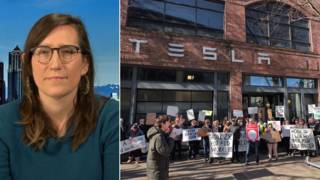HeadlinesMarch 14, 2019
Trump Orders Boeing 737 MAX Planes Grounded After Fatal Crashes
President Trump has ordered U.S. airlines to ground all Boeing 737 MAX 8 and 9 passenger jets, in the wake of a devastating plane crash in Ethiopia Sunday that left 157 people dead. Trump’s move came as his administration came under mounting pressure to remove the planes from service, after safety inspectors said a software glitch was likely behind Sunday’s crash, as well as the crash of a Lion Air flight of the same plane type last October that killed 189 people in Indonesia. Trump’s move came hours after Canada became one of the last countries in the world to ground the Boeing jets.
President Donald Trump: “Boeing is an incredible company. They are working very, very hard right now. And hopefully, they’ll very quickly come up with the answer. But until they do, the planes are grounded.”
Trump continued to praise the Boeing CEO, whom he spoke to several times. Trump’s order came as the Federal Aviation Administration spent days resisting calls to ground the 737 MAX jets. The FAA hasn’t had a permanent top official for over a year, and Trump’s government shutdown stalled the approval of safety upgrades—including new software that might have prevented Sunday’s crash.
Senate Votes to End U.S. Support for Saudi-Led War on Yemen
The United States Senate approved a War Powers Resolution Wednesday that would end U.S. involvement in the Saudi-led war in Yemen, which has killed tens of thousands of children and brought half of Yemen’s 28 million people to the brink of starvation. Seven Republicans crossed the aisle to join the Democratic Caucus in Wednesday’s 54-46 vote on the measure, which requires President Trump to cut off military support for the war in Yemen—unless U.S. troops are directly involved in fighting al-Qaeda. This is Vermont independent Senator Bernie Sanders, who co-sponsored the resolution with Utah Republican Mike Lee.
Sen. Bernie Sanders: “Today is an extremely important day. Today, we in the Senate have the opportunity to take a major step forward in ending the horrific war in Yemen and alleviating the terrible, terrible suffering being experienced by the people in one of the poorest countries on Earth. And today, equally important, we can finally begin the process of reasserting Congress’s responsibility over war making.”
The Senate passed a similar War Powers Resolution on Yemen late last year, but it died after then-Republican Speaker of the House Paul Ryan refused to bring it to a vote. The new Democratic-controlled House is expected to finalize approval of the measure, though the White House has signaled President Trump will veto it.
Pompeo Defends Support for Saudi Arabia Amid Reports of Torture
The son of a Harvard-trained doctor and dual Saudi and U.S. citizen is set to appear with lawmakers today to speak out about the torture he says his father is enduring at the hands of Saudi Arabia. Walid Fitaihi is a Harvard-trained doctor and hospital owner who’s been detained by Saudi police since late 2017. His son, Ahmed Fitaihi, says his father has suffered whippings and electric shocks in prison, after he was swept up along with 200 other prominent Saudis in a mass arrest ordered by Crown Prince Mohammed bin Salman. This comes a day after the State Department issued its annual human rights report, criticizing Saudi Arabia for the murder of Washington Post journalist Jamal Khashoggi, while defending continuing U.S. support for the kingdom. Secretary of State Mike Pompeo said, “The policy of this Administration is to engage with other governments, regardless of their record, if doing so will further U.S. interests.”
Senate Poised to Block Trump’s National Emergency Declaration
The Senate is poised to pass a bill today blocking President Trump’s declaration of a national emergency, which would divert billions of dollars of federal funds to build a wall on the U.S.-Mexico border. At least five Republican senators are expected to defect and join Democrats on the resolution: Senators Thom Tillis of North Carolina, Susan Collins of Maine, Lisa Murkowski of Alaska, Mike Lee of Utah and Kentucky’s Rand Paul. House lawmakers passed a similar measure late last month. President Trump has vowed to veto the bill, and Congress is far from the two-thirds majority needed to override a presidential veto. Trump’s declaration faces a number of legal challenges and could ultimately be decided by the Supreme Court.
Former Trump Campaign Chair Sentenced to 43 More Months in Prison
A federal judge in Washington, D.C., sentenced President Trump’s former campaign chair Paul Manafort Wednesday to an additional 43 months in prison on criminal conspiracy charges. The new sentence means Manafort will serve a 7.5-year prison term, after he was sentenced last week by a federal judge in Virginia on eight counts of bank fraud and tax evasion.
Moments after Manafort received his sentence, Manhattan District Attorney Cy Vance Jr. unsealed an indictment charging him with 16 counts of residential mortgage fraud and conspiracy. President Trump hasn’t ruled out a pardon for his former campaign chair, but Trump will not have the power to pardon Manafort on the New York charges if he’s convicted.
U.N. Warns Arctic on Pace to Warm by 5 Degrees Celsius by 2050
In climate news, a new United Nations report warns that unless nations act urgently and immediately on an unprecedented scale, the “ecological foundations of society” are at risk of collapse. The report by U.N. Environment found that even if the goals of the Paris climate agreement are met, winter temperatures in the Arctic will rise between 3 and 5 degrees Celsius—or as much as 9 degrees Fahrenheit—by 2050. U.N. Environment says nations should immediately shift away from fossil fuels to renewable energy, while reducing waste and promoting diets less heavy in meat and dairy.
Spanish Investigators Link CIA to Attack on North Korean Embassy
In Spain, police investigators have linked an attack on the North Korean Embassy in Madrid last month to the U.S. Central Intelligence Agency. On February 22, 10 assailants carrying fake weapons reportedly broke into the embassy, seizing computers and cellphones, tying up diplomatic workers and placing bags over their heads, before beating and interrogating them. After a North Korean Embassy worker climbed through a second-story window and called for help, the assailants fled at high speed in a pair of stolen vehicles. The Spanish newspaper El País reports at least two of the 10 assailants have been identified as having ties to the CIA. The CIA has denied any involvement. The raid on the embassy came just days before President Trump and North Korean leader Kim Jong-un met in Hanoi for a second summit on denuclearization. North Korea’s former ambassador to Spain, Kim Hyok-chol, now serves as a key North Korean envoy in nuclear talks with the U.S.
Brazil: Two Gunmen Kill 8, Reportedly Inspired by Columbine Massacre
In Brazil, two gunmen went on a shooting rampage Wednesday at a high school on the outskirts of São Paulo, killing eight people before turning their guns on themselves. At least 17 others were injured by gunfire during the assault, which saw panicked students climbing over the school’s walls and screaming to neighbors for help.
Unidentified student: “They just came out shooting, shooting. They didn’t look at anyone; they just started shooting at anyone who was close by.”
A police investigator said the two attackers—aged 17 and 25—were former students of the high school who were inspired by the 1999 Columbine massacre in Littleton, Colorado. In January, Brazil’s newly inaugurated far-right President Jair Bolsonaro signed a decree making it easier for people to keep guns at home.
Nigeria: Lagos Building Collapse Kills 10 and Traps Schoolchildren
In Lagos, Nigeria, at least 10 people are dead, and dozens more are trapped under rubble, after a four-story building containing a school collapsed Wednesday. Rescue workers continued to search for survivors after some 40 students were pulled from the wreckage. Residents had long reported cracks in the building, which was listed for demolition with the Lagos State Building Control Agency.
British MPs Reject “No-Deal” Brexit in Latest Blow to Theresa May
In Britain, lawmakers rejected a resolution Wednesday that would see the United Kingdom exit the European Union without a formal agreement—a so-called no-deal Brexit—setting up a vote Thursday that could see Parliament ask the EU for an extension of Brexit’s March 29 deadline. Joining opposition parties in Wednesday’s vote were members of Prime Minister Theresa May’s own Conservative Party, adding to speculation that May could soon face another no-confidence vote. Parliament’s repeated failures to approve a Brexit plan have fueled calls for a new, second referendum on Brexit.
Senate Confirms Neomi Rao and Paul Matey to Federal Bench
Back in the United States, the Senate has confirmed two more of President Trump’s nominees to the federal bench. Neomi Rao will replace Supreme Court Justice Brett Kavanaugh on the D.C. Circuit Court of Appeals. She’s a former law professor and clerk for Justice Clarence Thomas who’s backed by the archconservative Federalist Society. Also confirmed this week is Paul Matey, who previously served as legal counsel to ex-New Jersey Republican Governor Chris Christie. He’ll serve on the U.S. 3rd Circuit Court in Philadelphia. Their confirmations mean one out of every five appeals court judges have been nominated by President Trump.
ICE Using Vast Surveillance Database to Target Immigrants
The American Civil Liberties Union has obtained documents showing how Immigration and Customs Enforcement has gained access to a vast surveillance database of billions of records on vehicle locations and is using the data to track down undocumented immigrants. The data gathers license plate numbers from red-light and speed-limit cameras, toll booths, parking lot surveillance cameras and other sources in order to track drivers, with little or no federal oversight. Democratic Senator Ron Wyden of Oregon has called the program “a massive, for-profit location-tracking database [and] about the worst idea I have ever heard of when it comes to Americans’ privacy and security.”
Facebook Faces Criminal Probe for Sharing Private Data with Tech Giants
Federal prosecutors have launched a criminal probe into whether Facebook illegally shared the personal data of hundreds of millions of people with some of the world’s largest technology companies. The New York Times reports a grand jury in New York has subpoenaed information from at least two prominent makers of smartphones and other devices related to the alleged privacy breach. This comes as Facebook already faces a number of ongoing federal investigations, including a criminal probe into how Facebook gave personal data from some 87 million users to the firm Cambridge Analytica without their knowledge or consent—data the company used to sway voters to support President Donald Trump during the 2016 campaign.
California Gov. Gavin Newsom Signs Moratorium on Death Penalty
California Governor Gavin Newsom has signed an executive order putting a moratorium on plans to execute more than 700 prisoners on death row. This is Governor Newsom speaking in Sacramento Wednesday.
Gov. Gavin Newsom: “To line people up to be executed—premeditated, state-sponsored executions, one a week for over 14 years—that’s a choice we can make. Or we can make, I think, a more enlightened choice: to advance justice in a different way. It was a National Academy of Science report that came out that estimates one out of every 25 people on death row is innocent. If that’s the case, that means if we move forward executing 737 people in California, we will have executed roughly 30 people that are innocent. I don’t know about you; I can’t sign my name to that.”
The order does not abolish the death penalty in California but will ban the practice during Newsom’s tenure.
Former Texas Rep. Beto O’Rourke Joins 2020 Presidential Race
Former Texas Congressmember Beto O’Rourke announced today he’s running for president in 2020, joining a crowded field of candidates for the Democratic nomination. In November, O’Rourke drew national headlines when he nearly defeated Republican incumbent Senator Ted Cruz. Beto O’Rourke is headed to Iowa today; the state is home to the first caucus of the 2020 presidential primary season. Beto O’Rourke has not committed to support two major legislative priorities of progressive Democrats: Medicare for all and the Green New Deal.
Activists Demand Cancellation of Puerto Rico’s $72 Billion Public Debt
And in New York City, activists rallied outside federal court in Manhattan Wednesday, where a judge is overseeing Puerto Rico’s municipal bankruptcy proceedings—the largest such case in U.S. history. The protesters are demanding Judge Laura Taylor Swain cancel Puerto Rico’s $72 billion debt. This is activist Nicole Torres-Bruno.
Nicole Torres-Bruno: “You have people depopulating the island because their pensions are cut nearly in half. I know civil service people that if they are to retire tomorrow, they’ll only receive 42 percent of their pension. And governmental workers in Puerto Rico are not eligible for Social Security. So where does that leave them? … There’s more than 300 schools that have been closed in Puerto Rico. This is nothing short of Wall Street abuse and tactical steps toward extermination.”
Most popular
- 1
- 2
- 3
- 4
Non-commercial news needs your support
Please do your part today.











Media Options